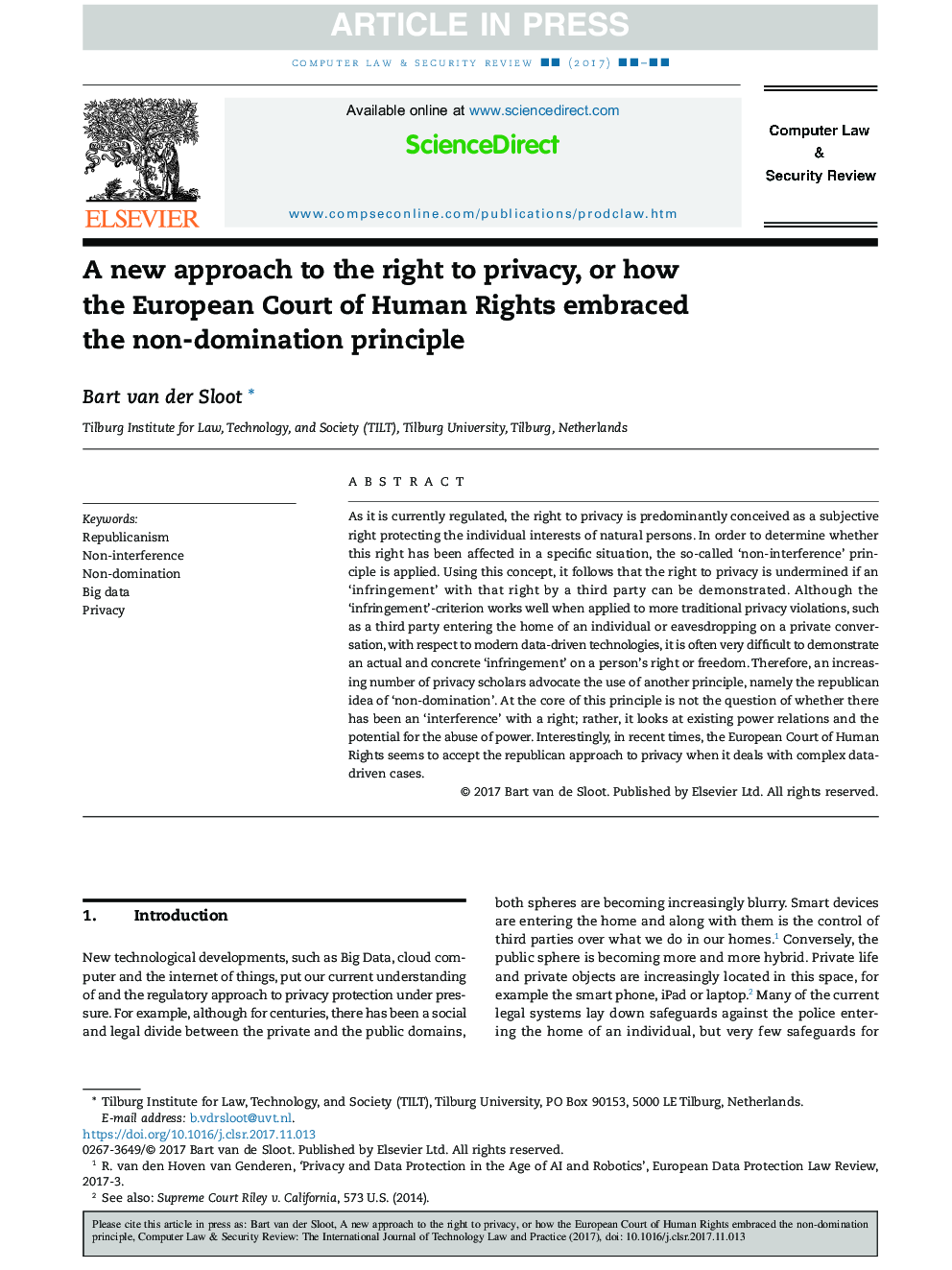| کد مقاله | کد نشریه | سال انتشار | مقاله انگلیسی | نسخه تمام متن |
|---|---|---|---|---|
| 6890476 | 1445187 | 2018 | 11 صفحه PDF | دانلود رایگان |
عنوان انگلیسی مقاله ISI
A new approach to the right to privacy, or how the European Court of Human Rights embraced the non-domination principle
ترجمه فارسی عنوان
یک رویکرد جدید به حق حفظ حریم خصوصی، و یا چگونه دادگاه حقوق بشر اروپا اصل عدم تسلط را پذیرفت
دانلود مقاله + سفارش ترجمه
دانلود مقاله ISI انگلیسی
رایگان برای ایرانیان
کلمات کلیدی
جمهوری خواهی، عدم دخالت، غیر سلطه اطلاعات بزرگ، حریم خصوصی،
ترجمه چکیده
همانطور که در حال حاضر تنظیم می شود، حق محرمانگی عمدتا به عنوان یک حق ذهنی محسوب می شود که از منافع فردی اشخاص طبیعی محافظت می کند. به منظور تعیین اینکه آیا این حق در یک وضعیت خاص تحت تاثیر قرار گرفته است، به اصطلاح "عدم دخالت" اصل اعمال شود. با استفاده از این مفهوم، به این معنی است که حق برخورداری از حریم خصوصی در صورتی که نقض حقوق فردی توسط شخص ثالث به اثبات رسیده باشد، تضعیف می شود. اگر چه معیار نقض حقوق بشر هنگامی که به نقض قوانین مربوط به حفظ حریم خصوصی بیشتر احتیاج دارد مانند یک شخص ثالث وارد خانه فرد یا استعفای در یک مکالمه خصوصی با توجه به فن آوری های مدرن مبتنی بر داده، به سختی کار می کند یک نقض واقعی و بنیادی در مورد حق یا آزادی فرد نشان می دهد. بنابراین، تعداد روزافزون محققان حفظ حریم خصوصی از استفاده از یک اصل دیگر، یعنی ایده جمهوریخواهی «غیر سلطه»، حمایت می کنند. در اصل این اصل مسئله این نیست که آیا "دخالت" با حق وجود داشته باشد؛ بلکه به روابط قدرت فعلی و پتانسیل سوء استفاده از قدرت نگاه می کند. جالب توجه است که به تازگی، دادگاه اروپایی حقوق بشر به نظر می رسد که رویکرد جمهوریتی را به حفظ حریم خصوصی در هنگام رسیدگی به پرونده های اطلاعاتی پیچیده رعایت کند.
موضوعات مرتبط
مهندسی و علوم پایه
مهندسی کامپیوتر
علوم کامپیوتر (عمومی)
چکیده انگلیسی
As it is currently regulated, the right to privacy is predominantly conceived as a subjective right protecting the individual interests of natural persons. In order to determine whether this right has been affected in a specific situation, the so-called 'non-interference' principle is applied. Using this concept, it follows that the right to privacy is undermined if an 'infringement' with that right by a third party can be demonstrated. Although the 'infringement'-criterion works well when applied to more traditional privacy violations, such as a third party entering the home of an individual or eavesdropping on a private conversation, with respect to modern data-driven technologies, it is often very difficult to demonstrate an actual and concrete 'infringement' on a person's right or freedom. Therefore, an increasing number of privacy scholars advocate the use of another principle, namely the republican idea of 'non-domination'. At the core of this principle is not the question of whether there has been an 'interference' with a right; rather, it looks at existing power relations and the potential for the abuse of power. Interestingly, in recent times, the European Court of Human Rights seems to accept the republican approach to privacy when it deals with complex data-driven cases.
ناشر
Database: Elsevier - ScienceDirect (ساینس دایرکت)
Journal: Computer Law & Security Review - Volume 34, Issue 3, June 2018, Pages 539-549
Journal: Computer Law & Security Review - Volume 34, Issue 3, June 2018, Pages 539-549
نویسندگان
Bart van der Sloot,
